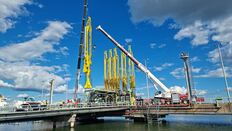- Neste is expanding logistics for liquefied waste plastic and rubber tires at its Porvoo refinery.
- New infrastructure includes unloading facilities, heating systems, and corrosion-resistant pipelines.
- A vapor recovery unit is being built for emission control.
- Completion of the logistics infrastructure is expected in 2024, with the upgrading unit ready by 2025.

Expansion of Logistics Infrastructure
Neste is enhancing its logistics infrastructure for handling liquefied recycled raw materials at its Porvoo refinery in Finland. This includes materials such as liquefied waste plastic and liquefied rubber tires. The expansion aims to support Neste’s strategic goals in advancing chemical recycling and transforming the Porvoo refinery into a hub for renewable and circular solutions.
New Installations
The new logistics installations feature dedicated unloading facilities at the refinery’s harbor. Neste is constructing an unloading arm with a heating system and pipelines to connect the harbor with dedicated storage tanks. These systems are designed to handle the unique requirements of liquefied waste plastic and rubber tires, which need heating to remain liquid and higher resistance to corrosion. Additionally, a vapor recovery unit is being built to control emissions during operations.
Strategic Steps
According to Jori Sahlsten, Senior Vice President of Refinery and Terminal Operations at the Porvoo refinery, the new logistics infrastructure is a crucial step in the refinery’s transformation. It will enable the processing of larger and continuous volumes of liquefied recycled raw materials, which is essential for the new upgrading unit. This unit will have the capacity to process 150,000 tons of liquefied waste plastic per year.
Timeline
The logistics infrastructure is expected to be completed in 2024. It will be ready in time for the completion of the liquefied waste plastic upgrading unit, which is part of the PULSE project and is scheduled to be finalized in 2025. The upgrading unit will convert liquefied raw materials into high-quality feedstock for the plastics and chemicals industry.

